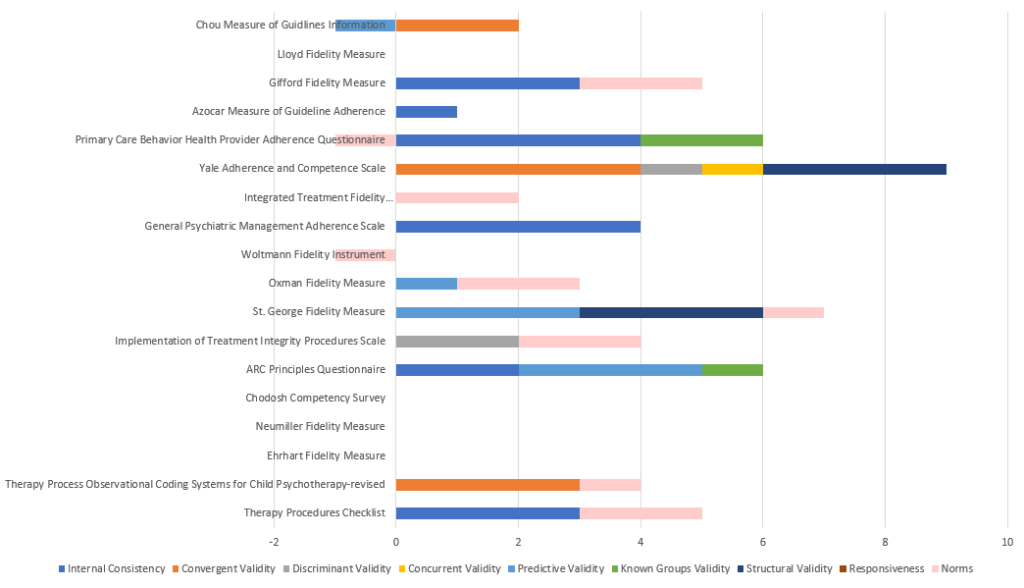Fidelity is defined as the degree to which an intervention was implemented as it was prescribed in the original protocol or as it was intended by the program developers. (Proctor et. al., 2011)
To see the head-to-head comparisons of the evidence-based assessment rating profiles for the instruments listed below, please click on the image below
Instrument assessing fidelity to the Availability Responsiveness and Continuity (ARC) intervention devised to measure adherence to its five principles.
Azocar Measure of Guideline Adherence
13-item checklist for assessing adherence to guidelines for treatment of major depression (items not available).
4-item survey to self-assess abilities in screening and prevention,
using validated assessment tools, treatment, and consultation for depression.
Chou Measure of Guidelines Information
Measure of adherence to guidelines for screening major depressive disorder (items not available).
Self-rated performance assessed using a single item that asked employees to rate the extent to which they use EBP with fidelity.
General Psychiatric Management Adherence Scale
The GPMAS is a 49-item scale based on principles of general psychiatric management that taps general therapist interventions and behaviors relevant to the treatment of patients with borderline personality disorder.
59-item instrument assessing fidelity to various evidence-based practices (items not available).
Implementation of Treatment Integrity Procedures Scale
The 22-item Implementation of Treatment Integrity Procedures Scale (ITIPS) is used to evaluate the extent to which RCTs address four domains of treatment integrity, including establishing, assessing, evaluating, and reporting integrity, as well as its two main aspects, therapist treatment adherence and therapist competence.
Integrated Treatment Fidelity Scale
The Integrated Treatment Fidelity Scale (ITFS) measures the extent to which 14 best practice recommendations are implemented for treatment of co-occurring disorders (items not available).
Form for rating fidelity to cognitive processing therapy for PTSD (items not available).
24-item survey presenting questions on fidelity methods and results, general program information, implementation challenges, model adoption, model adaptation, and program successes.
10-item fidelity measure for integrated management of depression in primary care.
Primary Care Behavior Health Provider Adherence Questionnaire
The Primary Care Behavioral Health Provider Adherence Questionnaire (PPAQ) is a 54-item survey with 24 items representing practice and session management, 14 items representing clinical scope and interventions, eight items representing referral management and care continuity, and eight items representing consultation, collaboration, and interprofessional communication.
11-item structured, session specific forms measuring adherence and competence (items not available).
The Therapy Procedures Checklist (TPC) is a therapist-report measure designed to assess the treatment models and procedures used in clinical practice
Therapy Process Observational Coding Systems for Child Psychotherapy – Revised
The TPOCS-RS is a 31-item instrument consisting of five theory based sub-scales used to assess treatment integrity.
Fidelity instruments designed for each evidence-based practice to operationalize measurement of components essential to implementation (items not available).
Yale Adherence and Competence Scale
The Yale Adherence and Competence Scale (YACS) is a 55-item scale tapping general (therapist interventions or behaviors common to most therapies) and unique (interventions unique to specific therapies) elements of behavioral treatments for drug use disorders in three ‘general’ and three ‘treatment’ scales.

